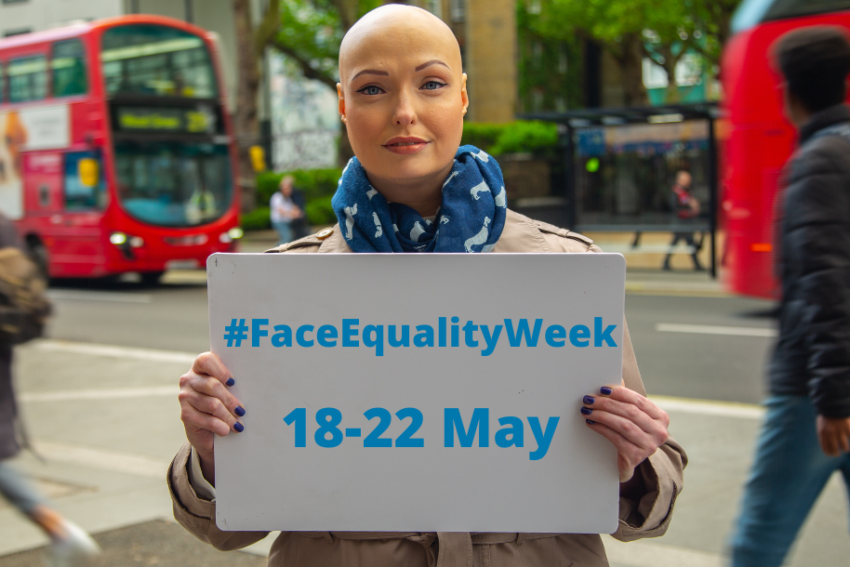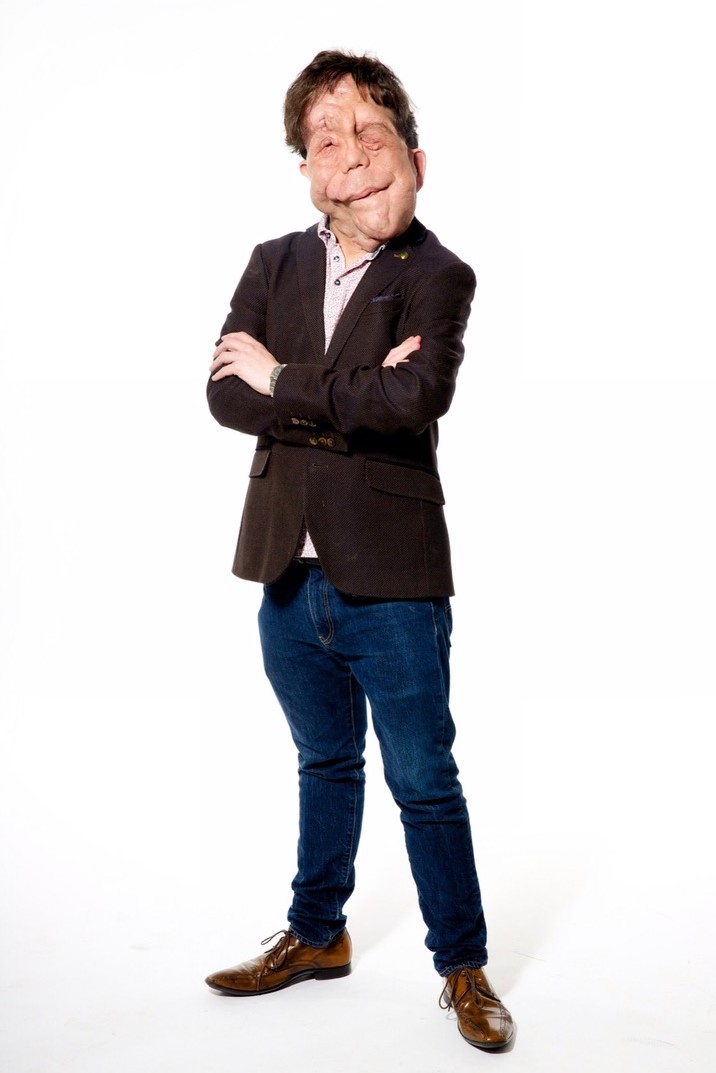
This week, we are dedicating a series of blogs to Face Equality Week. The first comes from Adam Pearson, an award-winning disability rights campaigner, actor, presenter and speaker. He has a genetic condition called neurofibromatosis (NF1), which causes benign tumours to grow along the nerves.
Face Equality Week
So here we are, Face Equality Week 2020, though this one feels different to previous years. If I’d have been writing this article merely a few months ago, under normal circumstances this article would be very different in tone, style and conclusion. Though at this unique moment in human history I wanted to say something meaningful, something helpful.
Allow me to introduce myself, or for those of you who know me reintroduce myself. My name is Adam Pearson, I am a TV Presenter, Actor and Campaigner (and Celebrity Mastermind Champion). I, like over 1 million people in the UK, have a facial disfigurement / visible difference. Mine is caused by a genetic condition called Type 1 Neurofibromatosis (NF1). This condition is characterised by the growth on non-cancerous tumours, called Fibromas, on nerve endings. In the same way that cables such as iPhone chargers are wrapped in plastic, your nerves are wrapped in cells called Schwann Cells. It’s the over-multiplication of these cells that cause said tumours. The condition itself has a very broad spectrum, with effects ranging from mild to extreme, I am at the later end of the spectrum. I often refer to myself (within very selected circles) as the Spinal Tap of NF1 – and if you got that reference congratulations, you are officially cool.
My experience of living with a facial disfigurement has been filled with ups and downs, it has shaped who I am as a personal and dare I say it has made me a better person. When you boil it down, it has been one of the main driving forces in my career, after being bullied horrendously for all 5 years of secondary school I naturally fell into advocacy as an adult.
As a disclaimer I should point out that I handled being bullied terribly, at the age of 11 I guess that my emotional intelligence and social fluidity wasn’t then what it is now. I was also, be it for better or for worse, a lot smarter than the people who were calling me names and giving me grief, as a result I was able to outwit, and out-insult them at every turn, which at the time seemed both justified and hilarious but with the benefit of hindsight I now know better. Rather than defusing the situation, I was simply exacerbating it. I’m not into having regrets, though I regard secondary school, in all its dirty glory, as one of those regrets. I often say that, regardless of your position on his work, Darwin’s theory exists in perfect motion in school playgrounds across the earth.
Fast forward 20 years (God I’m old) the situation is very different, I have a voice, I have a profile, I get to travel the world making movies and documentaries, I get to talk to people about things that I am passionate about and get to hear what they, in turn are passionate about. However this whole media career was never the plan, moreover it is a very fortunate by-product of being very good at advocacy, about learning to recognise inequality (and there is a difference between things being unequal and thing being unfair) and being able to communicate that with grace, humility and humour. Even over the past year I have learned that not everything is a battle and that not every hill is one worth dying on.

I have always been incredibly grateful to have had an amazing support network, be it my parent, my friends, media professionals who were willing to take a chance on me, as an adult I’ve never really struggled to find my place in this crazy world – I am one of the lucky ones. However, I am also aware that there are people out there with a facial disfigurement / visible difference who haven’t had the same support I have. People who live there live in constant fear of judgement and ridicule, for whom the outside world is a scary and unstable place, people for whom the idea of self-love seems so far out of reach.
If that’s you, trust me when I tell you it gets better, things get easier. I can’t wave a magic wand and make it all go away, but what I can do is be there, if your confidence is low, borrow mine, rest assured that there are people out there that love you for who you are right now, they aren’t looking back nostalgically at an older version of you they preferred. Nor are they looking to some future version of you that has their s**t together. The person you are right now is plenty good enough, and if people have an issue with that, that is their burden to bear, not yours.
This is normally the point in one of these articles with the writer hops up on their soapbox and judges the world for its transgressions against a particular minority group, siting their own life experiences blow by brutal blow. Currently though that honestly doesn’t feel like the right tack, here in May 2020.
Right now, in the midst of COVID-19, the world has never been more equal.
Right now, for one reason or another, everyone is afraid to leave their house.
Right now, for one reason or another, everyone is staring at each other with fear, loathing and suspicion.
Right now, we all wish we could see our friends, hug them and know that, come what may, we are loved, honoured and respected just as we are.
Once this COVID-19 situation passes, that day will happen, those fears will fade, those anxieties lift and those friendship rekindle. However, for many of the 1 million people who are affected by facial disfigurement / visible difference, the emotions may be conflicting. For them lockdown has been a welcome break from the cruel day to day life they experience, for many a return to “reality” is a return to a world that is rife with hostility, mockery and anxiety. Therefore, if you take anything away from Face Equality Week 2020, if there is one word I could burn into our collective consciousness, it would be empathy.
The very uncertainty we are all experiencing right now, that’s remarkably similar to the uncertainty I experienced at school. That feeling of being isolated, alone, not know where I fit within this ever changing world around me. So let me encourage you, no matter who you are, visible difference or not, when this is all over and we slowly go back to our lives, let empathy be at the heart of what you do. If you see someone who looks different, smile, say hello, ask them about their stories, be united by our commonalities rather than stand divided by our differences.
Have a great Face Equality Week 2020 and thank for taking the time to read this article, I hope it helped.
Adam
